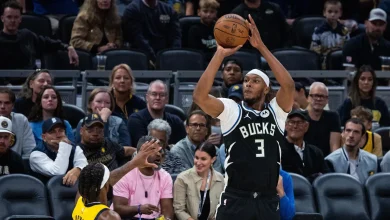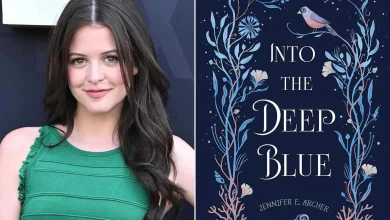President Bystander stumped when asked about pardon he signed hours earlier

Earlier this week, the public learned about the arrest of a Jan. 6 rioter who allegedly threatened to assassinate House Minority Leader Hakeem Jeffries, after he was freed from prison in January thanks to a pardon from Donald Trump. Two days later, in response to a reporter’s question, the president commented on the matter for the first time.
“You have thousands of people that we’re dealing with and, you know, if one goes haywire…,” Trump said, before changing the subject midsentence. He seemed to imply that only one of the beneficiaries of his Jan. 6 pardons has landed in legal trouble, though reality proves otherwise.
But as part of the same Q&A at Thursday’s White House event, the president was asked about a different scandalous pardon: his support for Changpeng Zhao, who helped finance the president’s stablecoin and put money in the Trump family’s pockets.
Asked why he pardoned Zhao, Trump initially suggested he didn’t know who the Binance founder was. “I do pardon a lot of people,” the Republican said, confirming a point he probably shouldn’t have acknowledged out loud.
Moments later, answering the question more directly, the president added, “I don’t know. He was recommended by a lot of people.”
In other words, on Thursday morning, Trump signed one of his most scandalous pardons to date, inviting unavoidable corruption allegations. On Thursday afternoon, he couldn’t explain his own actions from hours earlier.
This wasn’t the first time. In March, after Trump pardoned one of his donors, he was pressed for an explanation. He again appeared clueless: “They” told him that the criminal had been treated unfairly, which was enough for him to sign a pardon.
These weren’t trick questions. It’s not an unreasonable expectation that a president be able to explain a pardon for a convicted felon within hours of having signed the paperwork. And yet, Trump, by his own admission, struggled to justify the motivations for his own actions.
The frequency with which this comes up is unsettling. Days earlier, Trump appeared lost when asked about developments in Israel. Two weeks before that, when asked about a possible suspension of habeas corpus, the president initially thought that was a reference to a person, before telling a reporter, “Oh, I don’t know.”
Around the same time, Trump was forced to reverse course after he discovered that he’d cut off counterterrorism funds to New York City days earlier.
Late last month, as part of a half-hearted, last-minute attempt to prevent a government shutdown, Trump welcomed congressional leaders to the White House for a meeting. After it failed to produce results, Senate Minority Leader Chuck Schumer told reporters that the president was apparently “not aware” of the key elements of the Democratic position.
A month earlier, Trump said he didn’t “know anything about” a failed top-secret mission in North Korea in 2019 that he reportedly authorized. “I could look but I know nothing about it,” he added. “I don’t know anything about it. I’m hearing about it for the first time.”
At a White House event in July, a reporter noted the Trump administration had paused a shipment of military aid intended for Ukraine a week earlier. Asked who approved this, the president replied, “I don’t know. Why don’t you tell me?”
In May, during a Q&A with a White House press pool, Trump was asked about his administration’s new student visa policy, and he responded in a way that suggested he had no idea what the reporter was talking about.
Weeks earlier, less than 24 hours after he nominated Dr. Casey Means to serve as the nation’s next surgeon general, the president conceded that he didn’t know Means.
The day before that, amid reports that the administration was planning to expand its deportations agenda to Libya, Trump was pressed on the policy. “I don’t know,” he responded. “You’ll have to ask the Department of Homeland Security.”
The same week, NBC News aired Trump’s appearance on “Meet the Press,” and when host Kristen Welker asked whether everyone in the United States is entitled to due process, the president replied, “I don’t know. I’m not, I’m not a lawyer. I don’t know.” When Welker reminded her guest about the Fifth Amendment, Trump again said, “I don’t know.”
As part of the same exchange, Welker went on to ask, “Don’t you need to uphold the Constitution of the United States as president?” Once again, Trump answered, “I don’t know.”
As the interview continued, the host asked whether anyone in his administration had been in contact with El Salvador about returning Kilmar Abrego Garcia to the U.S. “I don’t know,” the president said. “You’d have to ask the attorney general that question.”
Around the same time, during a White House meeting with members of the World Cup task force, a reporter asked Trump about the ban on Russia competing in next year’s FIFA World Cup tournament. “I didn’t know that. Is that right?” Trump responded.
A day later, fielding questions in the Oval Office, Trump was asked whether he agreed with Treasury Secretary Scott Bessent’s comments about possible tariff exemptions for certain family consumer goods. “I don’t know, I’ll think about it,” the president said. “I don’t know. I really don’t.”
Around the same time, a reporter reminded Trump that Vice President JD Vance had said Russia was asking for too much to end the war in Ukraine. “When did he say that?” the president asked. Reminded that the vice president had made the comments hours earlier, Trump added, “Well, it’s possible that’s right. He may know some things.”
In case that wasn’t quite enough, at the same Q&A, Trump also said he had no idea that Republican Sen. Thom Tillis of North Carolina had announced his opposition to Ed Martin’s U.S. attorney nomination a day earlier.
In April, Time magazine asked Trump how much the U.S. government is paying El Salvador to imprison immigrants. “I don’t know,” the president responded. Asked if he approved the payments, the Republican added, “No, I didn’t.”
A month earlier, Trump was asked about four U.S. soldiers who’d gone missing during a NATO training exercise in Lithuania, and the president was clueless. Asked about the apparent assassination of a Russian general, Trump again had no idea what the reporter was talking about.
When the Republican was asked about the Signal group chat scandal and whether he believed classified information was shared, he replied, “I don’t know. I’m not sure, you have to ask the various people involved.”
No one appeared to be trying to trip up the president with unexpected inquiries into obscure topics. In all of these instances, Trump should’ve been able to respond to the questions with substantive responses.
But he didn’t. Instead, the Republican effectively said, over and over again, “Don’t look at me, I just work here.”
Most objective observers would probably agree that if Joe Biden had repeatedly said “I don’t know” in response to simple questions about his own administration, it would have been front-page news — and the Democrat’s responses would have played on a loop for hours on end in conservative media.
Similarly, Trump has personally invested considerable time and energy in accusing Biden of having been a doddering old “autopen” president who was unaware of events unfolding around him. Given the frequency with which President Bystander clings to “I don’t know” responses, he should probably consider a new line of attack.
Finally, let’s not forget that Trump’s authoritarian tendencies are rooted, at least in part, in the idea that governmental power must be concentrated in the president’s hands, to be executed as he sees fit.
It makes Trump’s apparent cluelessness that much more alarming.
This post updates our related earlier coverage.





